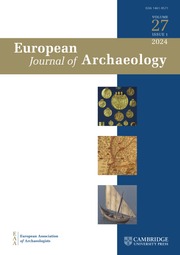Article contents
More Circe than Cassandra:1 The Princess of Vix in ritualized social context
Published online by Cambridge University Press: 25 January 2017
Abstract
Ritual and ritual specialists have often been dissociated from power in the writings of prehistorians and archaeologists. From ethnographic and ethnohistoric accounts, however, ritual specialists often exert disproportionate control over the maintenance, manipulation, and elaboration of social codes and practices. Their roles in ritual practice (orthopraxy in non-literate societies) and its effect on decision-making accord them considerable social and political importance. Due to this involvement they become the targets of ritual sanctions that include punitive rites, ritualized deaths, and suppression during periods of rapid social change, both from within their own societies and from without. The present article derives from a re-analysis of the Vix (Côte-d'Or, Burgundy) human skeletal remains, specifically with reference to the age, sex and health status of the interred individual. An evaluation of the social roles of this so-called ‘Princess’ is then attempted, integrating this biological information with that derived from a consideration of the grave inclusions and their imagery in the context of competitive feasting and social change in the late Hallstatt period.
Les préhistoriens de même que les archéologues dissocient fréquemment du pouvoir le domaine du rituel et ses spécialistes. D'un point de vue ethnographique et ethnohistorique par contre, les spécialistes du rituel exercent souvent un contrôle disproportionné sur le maintien, la manipulation et l'élaboration de codes et pratiques sociaux. Leur rôle dans la pratique rituelle (Orthopraxie dans les sociétés illettrées) et son effet sur la prise de décisions leur accordent une grande importance sociale et politique. Par cette implication, ils deviennent la cible de sanctions rituelles qui incluent rites punitifs, morts ritualisées et oppression durant les périodes de rapides changements sociaux, aussi bien au sein de leur société que de l'extérieur. Cet article traite d'une nouvelle analyse des restes du squelette humain de Vix (Côte d'Or, Bourgogne), plus précisément en ce qui concerne l'âge, le sexe et l'état de santé de l'individu enterré. On essaie ensuite d'évaluer le rôle social de cette soi-disant «princesse», ajoutant ces informations biologiques à celles obtenues à partir des objets funéraires et de leur imagerie, ceci dans le contexte du changement social survenu à la fin de l'époque de Hallstatt.
Zusammenfassung
Rituale und Ritual-Spezialisten sind in den Schriften von Prähistorikern und Archäologen oft von der Macht getrennt worden. Nach ethnographischen und ethnohistorischen Gesichtspunkten zeigen die Praktizierenden der Rituale aber oft überproportionale Kontrolle über die Aufrechterhaltung, Beeinflussung und Ausarbeitung sozialer Codes und Praktiken. Ihre Rolle in der rituellen Praxis (‘Orthopraxis’ in den schriftlosen Gesellschaften) und deren Effekt auf die Entscheidungsfindung weisen ihnen beträchtliche soziale und politische Bedeutung zu. Wegen dieser Beteiligung werden sie – innerhalb als auch ausserhalb ihrer Gesellschaften – während Perioden rapider sozialer Veränderungen zum Ziel ritueller Sanktionen, die Bestrafungsriten, ritualisierte Tode oder andere Formen der Unterdrückung einschliessen.
Die vorliegende Studie geht aus der erneuten Analyse der menschlichen Skelettreste von Vix (Côte-d'Or, Burgund, Frankreich) unter besonderer Beachtung der Informationen zu Alter, Geschlecht und Gesundheitsstatus des beigesetzten Individuums hervor. Eine Überprüfung der sozialen Rolle der sogenannten ‘Prinzessin’ unter Einbeziehung der biologischen Daten und der Grabbeigaben sowie deren Erscheinungsbild im Kontext wettstreitender Feiern und sozialen Wandels in der späten Hallstatt-Periode kann so unternommen werden.
Keywords
- Type
- Articles
- Information
- Copyright
- Copyright © 2002 Sage Publications
Footnotes
Circe, a witch, is the enchantress and seductress of Odysseus. She turned half of Odysseus’ men into pigs (Odyssey). She purified Jason and Medea with sow's blood after the murder of Apsyrtus (Graves 1981:205–208). After refusing his advances, Cassandra was given prophetic vision by the god Apollo but was simultaneously cursed in that no one would believe her prophesies (Iliad).
References
- 6
- Cited by


